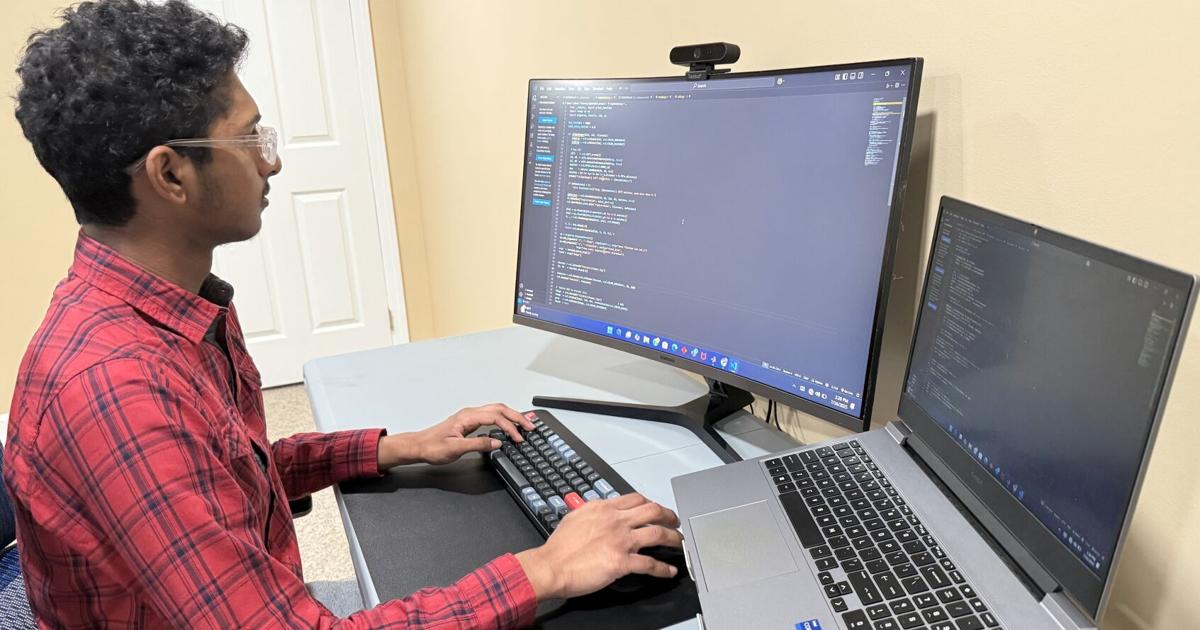Dhanvin Ganeshkumar on his computer.
Courtesy Photo
Growing up, Dhanvin Ganeshkumar remembers watching his grandparents struggle to use a computer. They had physical tremors, which made even the most basic digital tasks almost impossible for them. His hope to find a solution to their struggle is one of the reasons that he teamed up with Zoeb Izzi, and they created Swype AI, a hands-free computing app that helps people with motor disabilities.
“When I did try looking for existing solutions, I realized that they were either A, too expensive, costing upwards of thousands of dollars with fancy hardware, or B, limited to outdated software,” said Ganeshkumar.
The Thomas Jefferson student, who is about to start his junior year, decided he wanted to create something affordable using technology that almost everyone already has in their pockets, a smartphone camera.
The original model for Swype AI helped his grandparents navigate their screens more easily. Ganeshkumar realized the tool could transform the lives of millions of other people who struggle with motor disabilities, especially those in underdeveloped communities who don’t have access to expensive equipment.
Swype AI co-founders Zoeb Izzi on the left and Dhanvin Ganeshkumar on the right.
Courtesy Photo
“Once it’s set up, you can simply wave your hand or speak a command, and Swype AI takes care of the rest,” said Ganeshkumar. “We’ve made it as simple and seamless for the everyday uses that people need.”
Ganeshkumar first became interested in healthcare disparities when he had a detached retina in the eighth grade. Doctors told his family he needed surgery. His mother began calling ophthalmologists, but no one was willing to perform the surgery on him because he was young and this type of surgery was normally performed on older people. His mother phoned 10 surgeons before she found one who would operate.
“It was at that moment that opened my eyes to global health equity,” said Ganeshkumar. “I started asking what if someone in my place didn’t get that doctor’s visit? What if no one answered that test call?” He said the question stayed with him and he started to realize that many people face the same barrier to care because they don’t have the right resources.
His experience with the eye surgery was another component of his research into digital inequity.
To make Swype AI more usable, Ganehskumar has spoken with over 15 accessibility organizations, including the Parkinson’s Foundation and the National Multiple Sclerosis Society, to understand user needs better and refine how it can work for people with ALS, cerebral palsy, and other tremor-related impairments. That research led him to Jen McDonald-Peltier at the Center for Accessible Technology, who has been an invaluable mentor.
“I learned that this motor disability, as a whole, comes from various conditions; some conditions may allow fine movements and specific fingers, while others can only permit broader, slower motions. In the most severe cases, users cannot move their hands at all,” said Ganeshkumar.
The research led to more ways to accommodate more users. Swype AI currently incorporates 30 different physical combinations. These can be anything from a static pose like the thumbs-up sign to dynamic motions like waving multiple fingers.
Each gesture is then customized to trigger a specific action like clicking, scrolling, opening apps, or dragging files. For individuals who can’t move their hands, Swype AI has added Open Voice OS, which allows users to control their devices entirely through speech.
Ganeshkumar said the app has received a lot of attention. It was selected from a highly competitive field of high school teams to win $2,500 in the SXSW Student Impact Challenge.
Ganeshkumar is also a top 50 finalist for the 2025 Chegg Global Student Prize Challenge. The winner will be selected later in the year. He has been invited to present at the MIT AI & Education Summit, the Harvard Global Health & Leadership Conference, the Johns Hopkins Global Health Leaders Conference, and more.
Swype AI is currently undergoing independent beta testing. The goal is to release the app later this year. If you, or someone you know, could benefit from Swype AI, you can learn more at swypeai.tech.

